Nestled in the foothills of the Rocky Mountains with an active outdoor lifestyle, the Boulder JCC reflects its local area through a focus on convening community, building relationships and sustainability.
As a central place where people of all ages and backgrounds gather in Boulder County, Colorado, the Boulder JCC has worked hard to redefine what it means to be a community center and what the role of a community center is.
From the purchase of the land in 2000, to a highly intentional design plan, and finally moving into the state-of-the-art facility in 2016, Jonathan Lev — the executive director — and his team have created a truly unique environment where the entire community is invited to learn and grow together through programming and gatherings on the JCC’s campus.
The Boulder JCC Vision
Lev arrived to the JCC in 2010 as the only year-round, full-time employee following years of experience in different industries. After graduating from college as a certified teacher and then working in door-to-door sales for six months, he honed in on how to work with people and build relationships. This led him to realize his purpose lay along four major themes: building community, the outdoors, education and Jewish life.
He practiced these themes by working as an associate camp director at Union for Reform Judaism Eisner Camp to further develop leadership skills and build intentional community, then pursued graduate studies at New York University in nonprofit management and Jewish studies. Soon after the program, he began his work with the Boulder JCC.
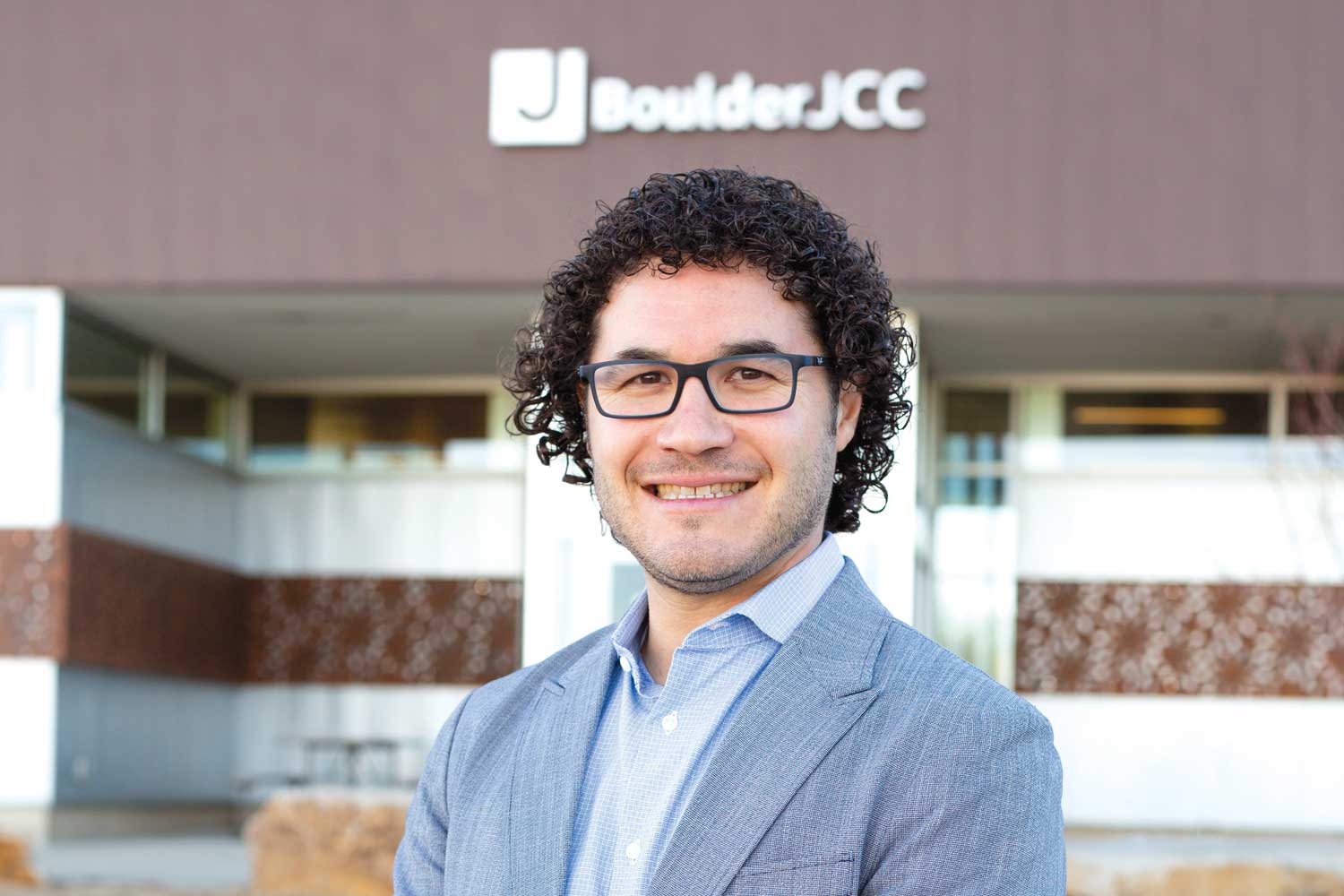
“This JCC called to me because of its unending room for creativity, a community that had lots of energy for what might be possible and a passionate group of people to help make it happen,” said Lev. “At that time, it was a relatively start-up JCC, but the foundation was so strong and provided a platform for me to bring my previous experience and entrepreneurial nature to create what this community wanted and needed.”
In his position, Lev was integral to the design and creation of the current campus, which is home to a number of unique features not found in many community centers. His vision was brought to life with the help of a team of volunteers, and Colorado-based RB+B Architects and Calcon Constructors. “In designing and creating our current campus, we made the conscious decision to approach health and well-being holistically,” he said. “We also decided not to build a fitness center. Instead of a membership model, all people who live in Boulder County and beyond are a part of our community, and we have built our financial model on other areas of earned revenue and philanthropic support.”
To make these unique aspects a reality, Lev shared he started with asking, “If community is our middle name, how do we create a space that is truly for all people in Boulder County? How do we uplift everyone through creating opportunities for people to connect with one another?”
Making Spaces Feel Alive
At the start of the pandemic, almost everyone noticed how important it was to immediately get on board with virtual offerings. Why? Because the basic necessity of community was missing. Now, the industry is shifting to rethink and design its facilities to provide members the community spaces to gather — something the Boulder JCC already did six years ago.
“I’ll never forget I was in conversations with other JCC directors when we were designing this building,” said Lev. “They looked at my plans and said, ‘Your lobby is too big. I don’t understand.’ I said, ‘I don’t think you understand what we’re building then.’”
Lev described the lobby as one main entry point designed as a living room that features a high-end art gallery, fireplace and couches. “It all funnels together and cross-pollinates,” he said. “The Early Childhood Center parents are interacting with the older adults. It allows us to truly create this multi-generational aspect of what community really means.”
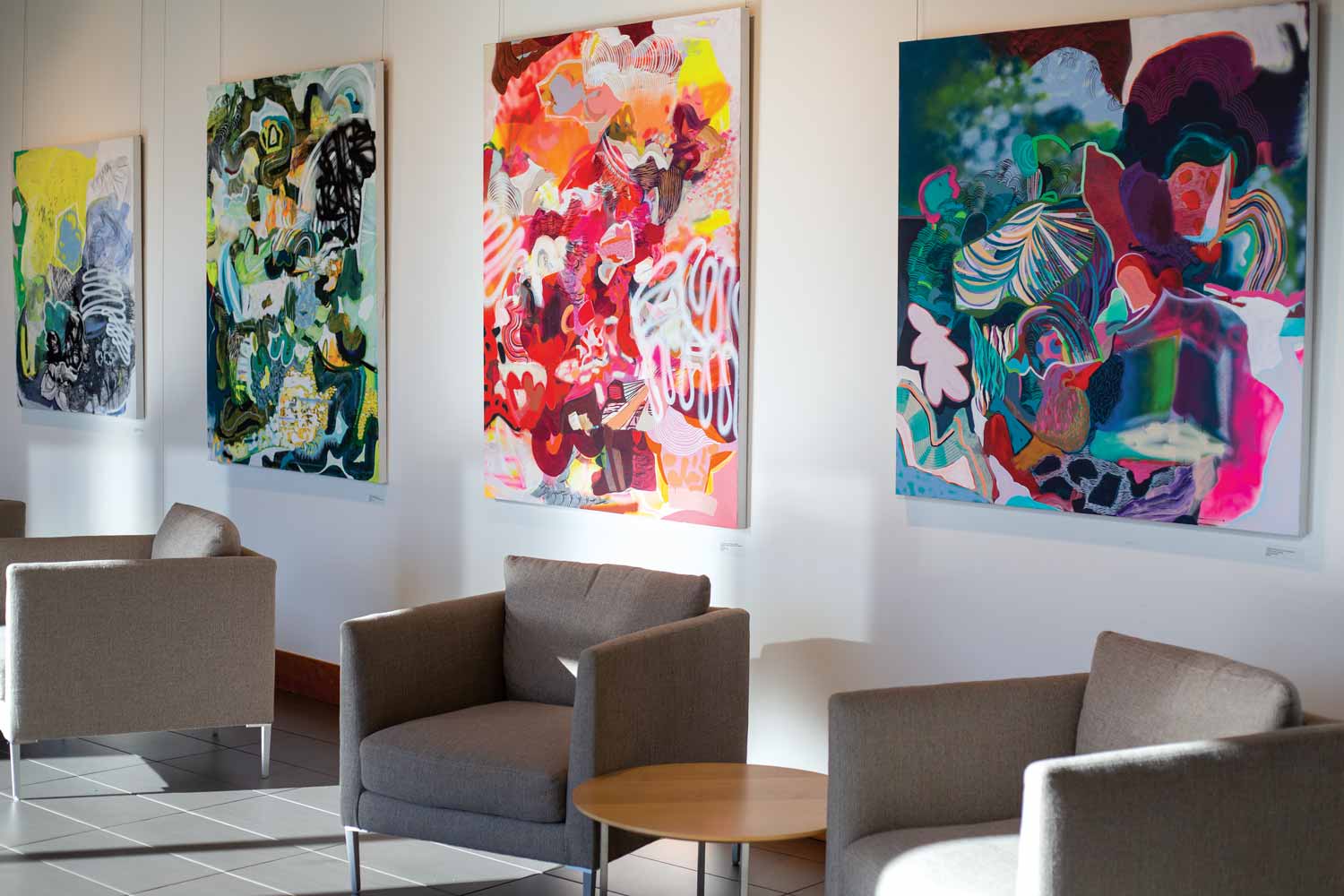
A unique aspect of the lobby is its ability to change functions. Lev explained the furniture in the lobby can pop-up on wheels and be relocated to create a reception area for any of the events taking place in Levin Hall — the JCC’s premier event space. Levin Hall is a venue with over 4,000 square feet, plus a 500-square-foot stage. The back of the room is lined with glass windows and doors that overlook the mountains and open onto a spacious, partially-covered outdoor patio with a built-in fireplace.
Lev shared his vision stemmed from making spaces feel alive. When he also decided to design a courtyard, he described it similarly to the design of the lobby. “It narrows before it opens back up, almost as if you’ve entered the JCC once you’ve entered the courtyard, even though you haven’t entered the building yet,” he said. “And that was the idea of a constant flow between indoor and outdoor. With a place that’s so beautiful and has so much sunshine, we wanted to create meaningful outdoor spaces.”
And another way meaningful outdoor spaces are utilized at the Boulder JCC is through its farm and sustainability efforts.
Milk and Honey Farm
A two-plus acre sustainable farm, Milk and Honey Farm, brings the community together for educational and experiential programs and activities grounded in Jewish heritage, tradition and values. The farm provides a place for individuals to connect on the simplest level with soil, plants, animals and people.
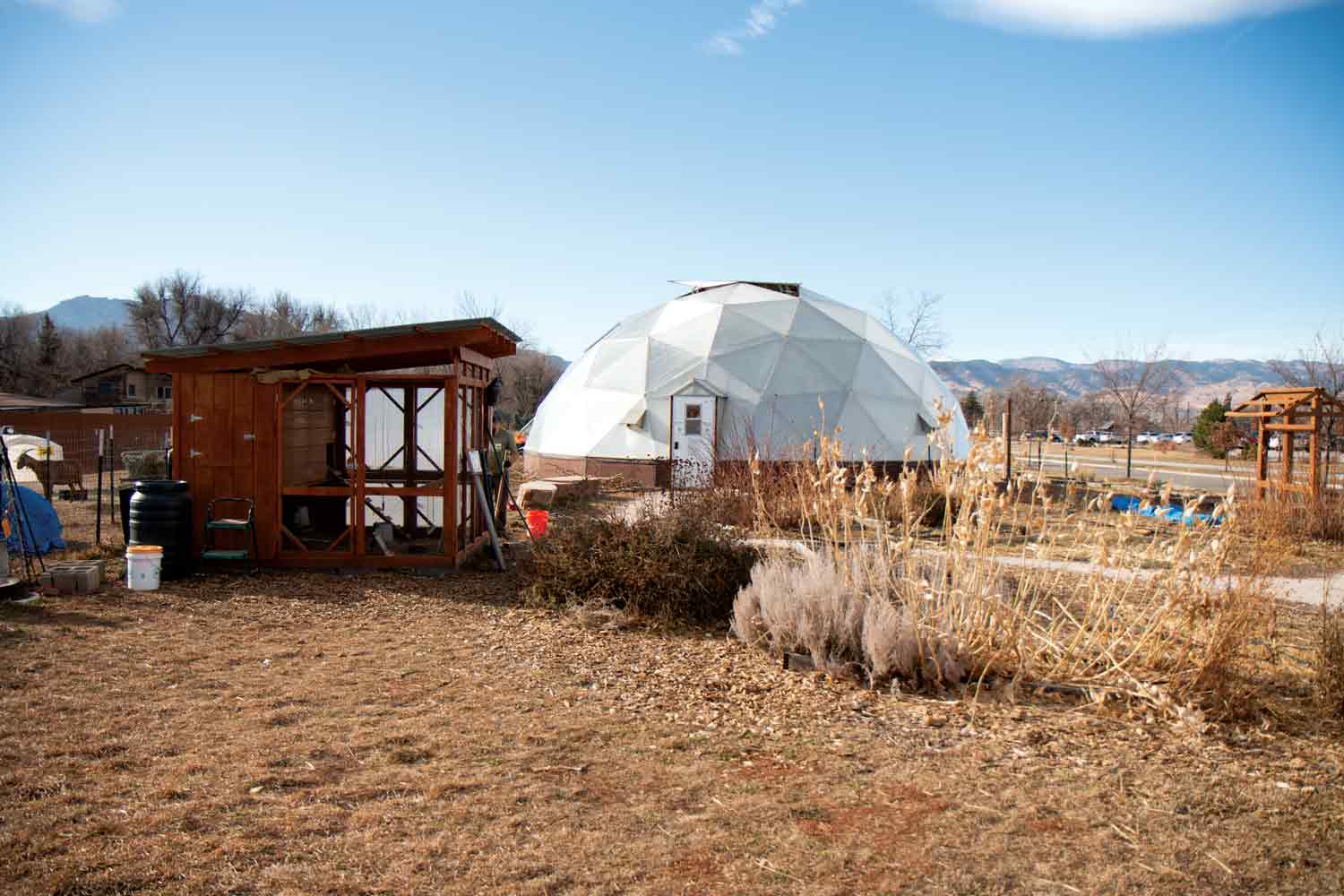
“Having the farm facility allows us to have a physical and fun way of enacting sustainability,” said Becca Gan Levy, the farm and sustainability director. “Where our food comes from, how we grow our food and what we eat is a big part of living a sustainable lifestyle on our planet. And when we get to do it here together, it makes it really joyful.”
With sustainability as a foundational pillar of the Boulder JCC, a variety of programs and educational opportunities are integrated throughout the entire campus. Some of these include:
- Year-round adult, family and holiday programs on Milk and Honey Farm.
- Hands-on learning laboratory for the Early Childhood Center.
- Cherryvale day camp and after-school programs on the farm.
- Year-round adult programs on sustainability.
- Solar panels by The Solar Revolution on the JCC building to help offset power use.
- Solar panels on the barn to power the farm.
- A 42-foot growing dome by Growing Spaces on the JCC’s campus.
- The JCC building is LEED-certified.
- Milk and Honey Farm is run using organic practices, including cover cropping, crop rotation, composting, manual and physical pest control, and large crop diversity.
- Use of agricultural ditch water instead of city water for watering the whole property.
- Participation in the Hazon Seal of Sustainability Program.
- Sustainable holiday guides.
Gan Levy shared one of her favorite aspects of having the farm as part of the JCC is seeing kids who started in the Early Childhood Center grow up through the program. “They come back every summer at camp and have such ownership over the space,” she said. “And they know without even needing to see a sign that a bachelor’s button or calendula flower is edible. To see these kids who know so much, that gives me a lot of joy and meaning.”
If having a farm as part of your community center is not an option, Gan Levy elaborated it’s easy for every community center to focus on sustainability — even in small ways — and something everyone should prioritize. This is especially relevant now as the Gen Z population in particular has heightened climate change awareness.
“People change their behavior when their friends and community change their behavior,” said Gan Levy. “That’s the easiest way to do it because it’s hard to do it otherwise. And as a community center, we are someone’s community. Being able to model it, support it and promote it makes it easier for people to live a sustainable lifestyle.”
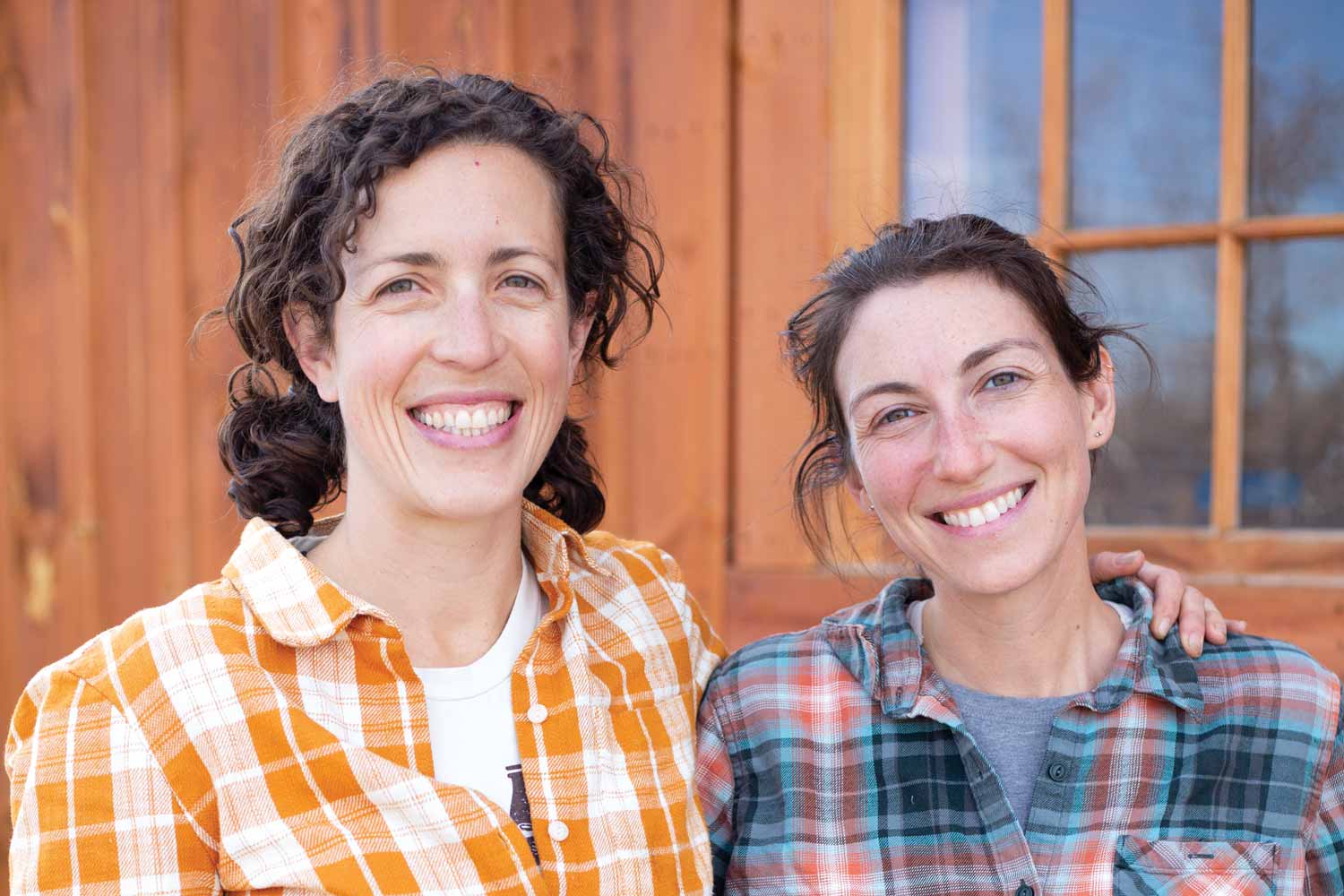
Gan Levy suggested having a few garden beds to grow food is a great way to get the community involved. “Donating the produce, or cooking the produce with schools or campers, offers a really wonderful way to embody a sustainability practice,” she added. “And food is really delicious so it’s an easy place to start.”
While the farm is an integral part of the Boulder JCC community, Lev emphasized it’s in no way a profit center. Rather, it’s an engagement center, and engagement centers lead to philanthropy, which is half of the JCC’s annual $6.5 million budget.
Leading with Engagement
Because the Boulder JCC doesn’t have a fitness center, Lev explained its financial model is instead built on other areas of earned revenue and philanthropic support. “Our JCC was built on the belief that through meaningful engagement, our community would be incredibly philanthropic,” he said. “Over the last decade, we’ve built a team of fundraising professionals who work in concert with our program teams to provide opportunities for engagement, connection and community. Through this process — alongside our enhanced use of data — around 50% of our annual budget comes from philanthropic support.”
By converting to Salesforce software and utilizing the data, Lev explained the JCC has been able to do a deep dive of integration that transformed the way departments operate by creating cross-departmental collaboration and stronger relationships.
“We built a system that helps us understand who people are and we lead with engagement first,” said Lev. “It’s not leading with philanthropy first. Because our systems talk to one another, we now have information about people so when we do ask for support, they’re already connected, we know how they’re connected, and we can anticipate who’s more inclined to give. It’s a tremendous amount of data that’s now integrated across all systems.”
One of the departments dedicated to leading with engagement is Community and Family Engagement. This department is able to strategically use data to connect with community members in the ways that are most relevant and interesting to them. This also helps build stronger relationships with individuals because the data shows how they interact with the JCC.
In addition, this department helps with welcoming new community members to Boulder through the New(ish) to Boulder program. “A lot of people move here from other places, and most of them don’t have any family,” said Lev. “They’re looking to be connected, so we meet with all those people, and then we have a few different avenues to onboard and bring them into the community and connect them with other people. We welcome hundreds of new families a year.”
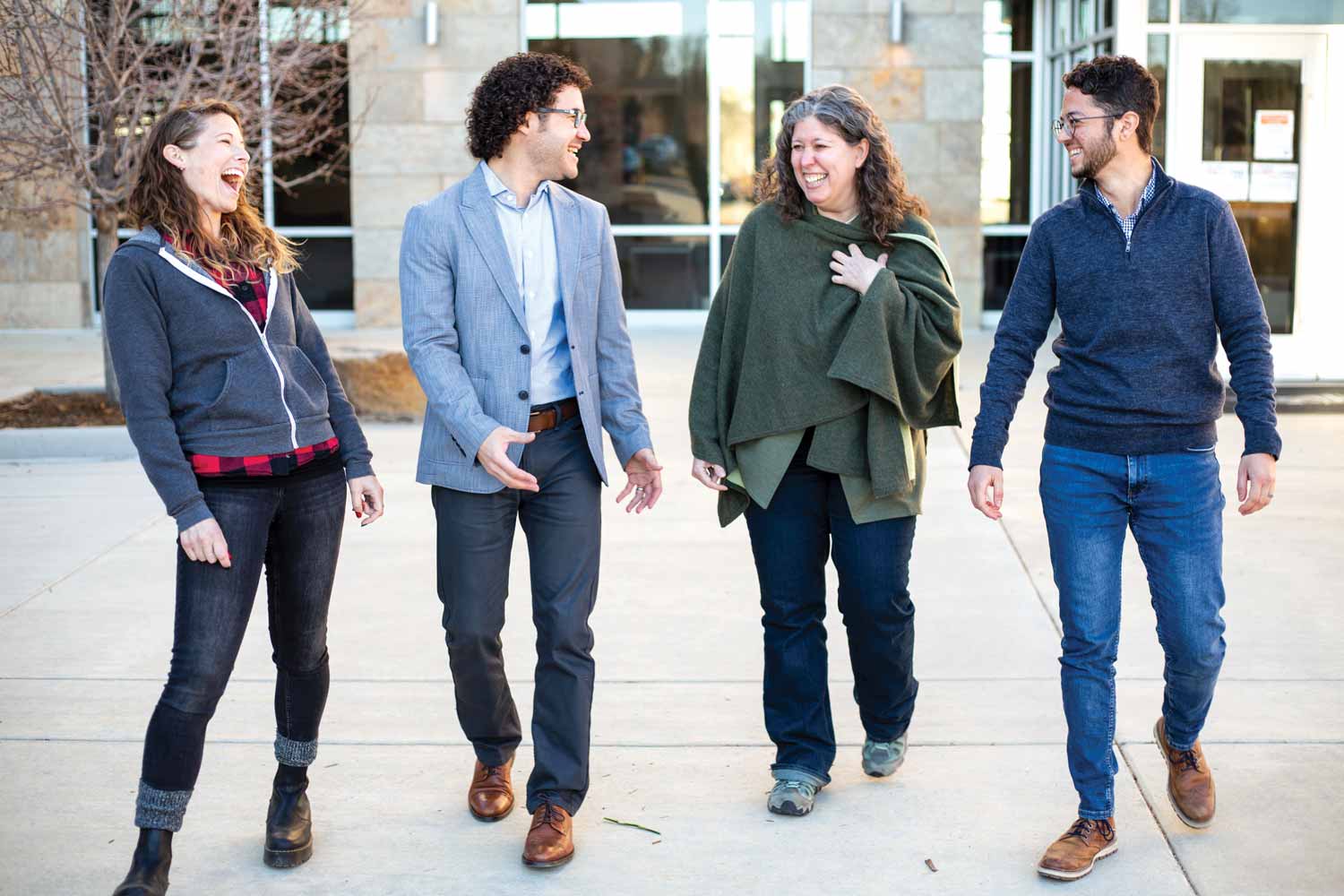
In the process of welcoming these new families each year, one of the aspects most unique about the Boulder JCC that helps it lead with engagement is the fact it has no membership. “We have no membership and it’s intentional because we wanted everyone to feel like they were part of the Boulder JCC,” explained Lev. “We didn’t want to define somebody as a member, a guest or a participant. We wanted people to be community members.”
Lev elaborated most traditional community centers question how the JCC functions without a fitness center or membership, but he said it’s a benefit because the JCC isn’t reliant on someone needing be a member to generate traditional revenue. “I’m reliant on the relationship with them, and them feeling like we’re doing really good for the community,” he said. “What we’ve found is our number of donors has increased. And the amount of money we’re raising on an annual basis has also increased through the pandemic. And it’s consistently growing at surprising rates.”
Growing the J
Lev shared one of the great things about the Boulder JCC is the fact it’s constantly evolving — both from a programmatic and community centered standpoint — as well as facility and capital. Over the next few years, the J has several huge projects on its list, as well as a goal to expand its amount of land.
“I’m so proud of our organization,” said Lev. “We are continuously reflecting on who we are as an organization, what the community of Boulder County needs and what our role is within the community. We are committed to ensuring that the Boulder JCC reflects and creates the Boulder County we want to live in and that we uplift everyone in our community.”
Photos by Heather Hartmann.










